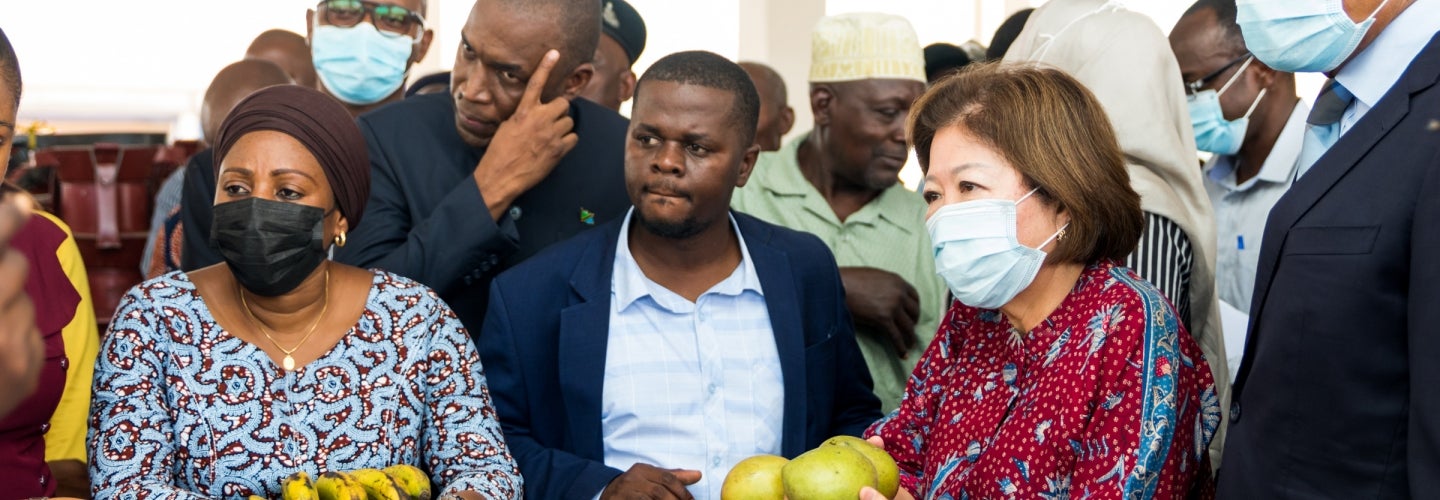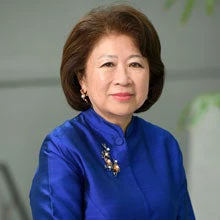 Jonathan Seni/世界银行
Jonathan Seni/世界银行
On a recent visit to the United Nations, I was inspired to see more women in leadership positions across the UN, and I enjoyed the opportunity to meet with many of them. We all had different life journeys and challenges to overcome – including discrimination, laws that sided with men, and many more. However, what we had in common was a strong will and resilience in our abilities to persevere and persist against all odds, while remaining focused on our objectives. Some of us shared stories of our journeys. They were remarkable testaments of what these women leaders have been able to achieve.
Let me take this moment on International Women’s Day (IWD) to reflect on a few lessons that I have learned throughout my career on women and leadership, which I hope will inspire women everywhere to be part of and lead the changes we need to make happen.
Navigating Bias
I am pleased to see that this year, #BreakThe Bias is emphasized as part of the theme for IWD, “Gender equality today for a sustainable tomorrow”, calling on the world to tackle stereotypes and discrimination. There is an unconscious bias that persists, that it’s negative for a woman to be ambitious and decisive. You need to manage that and show that you can lead, but that doesn’t mean you have to be aggressive in doing so. You can be a good leader and be firm in your decisions, but still have empathy. The other important thing is to do what I call “sensing;” that is, really listen and understand different views upon which to base your decisions and actions.
I am a triple minority—a woman, an ethnic Chinese and a Catholic in Indonesia, a majority Muslim country where I am from. I also lived and studied abroad for 20 years and had to adjust to circumstances coming back home as a young woman. As a result, I’m quite used to being the “odd person out” in any situation, but I’ve learned to survive through observation. You have to observe to understand norms and be respectful, then adjust and adapt to allay suspicion or biases that people may have against you because you are from a different background or they have never had a woman boss!
Political Will and Agency
During my time in the Indonesian government, what I learned was that there has to be the political will to involve women at all levels of decision making, down to the village level. This implies that from the design to the implementation of the policy, one needs to include the dimension of women in the policy and also include them in decision making.
Let me give you an example. When I was the Minister of Trade, one of my tasks was to revitalize the traditional markets. After visiting many of them, I noticed that 90 per cent of the traders and the majority of the shoppers were women. I also saw young children running around the market while their mothers were working. But every market was designed in the same cookie-cutter manner. After assessing the situation, including listening to the women traders, we changed the design to meet requirements for women—more toilets with space for breastfeeding, and a childcare center within the market. These became profit centers because users would pay. We focused not just on the physical revitalization of the market, but also better managed and provided support to empower the women traders with access to finance or other entrepreneurial skills.
Breaking the glass ceiling
To young women aspiring to be in leadership positions, I would say always push yourself beyond your comfort zone. Have the confidence to take on a challenging task and show that you can deliver, even if you’ve never done it before. But remember that it’s not about your personal ability to deliver or getting credit. It’s about your ability to work with others, to collaborate and bring others along, which in turn helps you to build a network and support for your ideas. I’m a great believer in networks. You can proactively join many networks and be open to offer help or advice, and it will surprise you how and when these networks prove to be beneficial.
Especially when you're young, try to find good mentors who will look out for you and help you. I also benefitted from mentoring and I was lucky to have found really amazing mentors, both men and women. Good mentors can help open doors, tell you whether you are doing something right or wrong and give you good and unbiased advice. Having self-confidence and the ability to articulate your stance are important skills to develop. Many women have self-esteem and confidence problems, but this is something to overcome. You can assert your views and position without being aggressive. Be well prepared, making sure that your opinion is substantiated, and people will listen to you because you have the evidence, well thought out arguments and eventually experience, which will kick in to give you the upper edge.
The World Bank #AccelerateEquality initiative
Looking ahead, we must address the structural barriers that have limited opportunities for women and girls pre-pandemic. This includes expanding social safety nets and building in economic inclusion , access to education and health services, improving the availability of childcare, and addressing gender-based violence and its underlying causes. A legal environment that encourages and incentivizes women’s work can create economic opportunities and make women more resilient not only in the face of crisis but throughout their lives and careers.
This is why the World Bank has launched a year-long #AccelerateEquality initiative, which explores the progress made and lessons learned over the last 10 years in closing gender gaps and promoting girls’ and women's empowerment for transformative change. Because we can’t manage what we don’t measure, we also launched the Gender Data Portal, which offers over 900 gender indicators in different formats, ranging from raw data to visualizations and stories.
Transformative change toward gender equality requires a concerted effort by government, the private sector, civil society, and other stakeholders. In my experience, in addition to leadership and political will to mainstream gender issues in a country’s laws and regulations, agency and women’s participation in decision making are also key, as mentioned above. Increasing women’s participation in the labor force and the economy, addressing shortfalls in access to education and health services, ensuring women have access to finance as well as digital and other skills, are also key enablers for girls and women to realize their full potential.
Let’s all work together to make these transformative changes, because gender equality is not just the right thing to do but the smart thing to do, to achieve green, resilient and inclusive development.


Join the Conversation